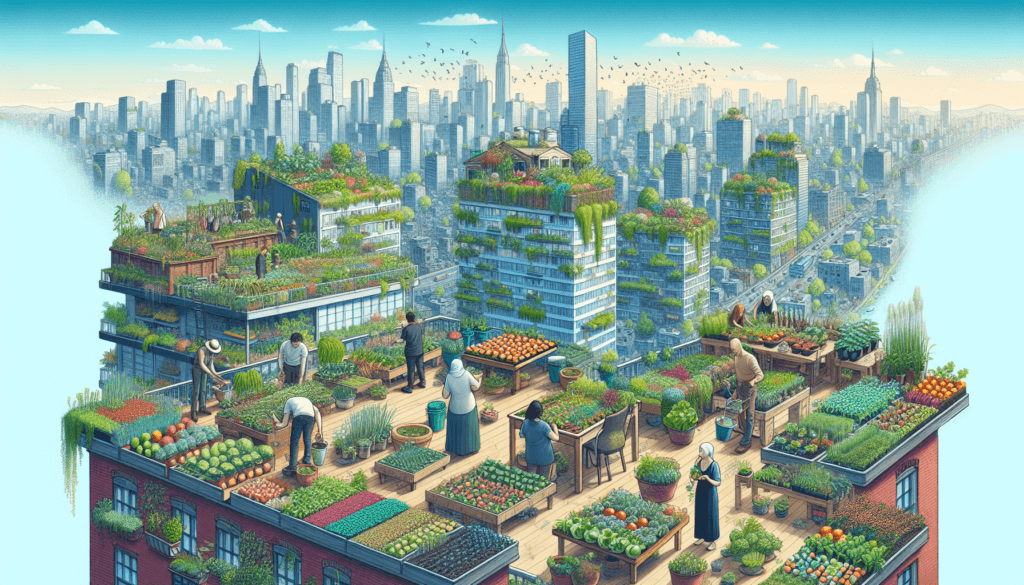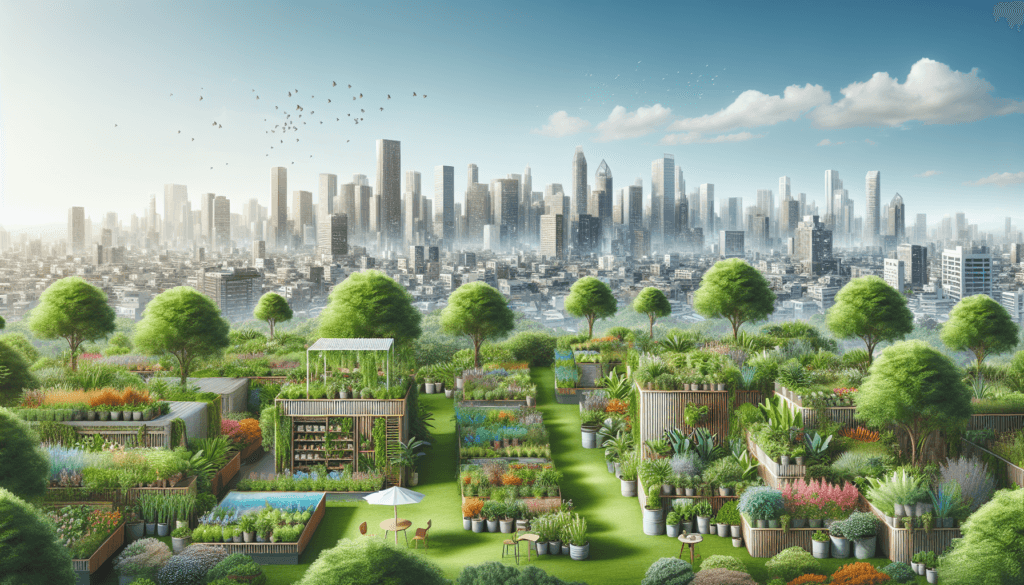Urban gardening is not only a trendy and fulfilling hobby, but it also has numerous benefits for the environment. By utilizing small spaces within urban areas, individuals can create thriving gardens that improve air quality, enhance biodiversity, and promote sustainable living. These green oases not only beautify the concrete jungles that we live in but also offer a sanctuary for insects, birds, and other wildlife. Moreover, urban gardening reduces the urban heat island effect and helps to mitigate the adverse effects of climate change. Whether you have a balcony, a rooftop, or even just a windowsill, urban gardening is a simple yet impactful way to make a positive difference for our environment. Urban gardening is not only a rewarding hobby, but it also offers a myriad of benefits for the environment. By cultivating a green space in the midst of a bustling city, you contribute to improving air quality, mitigating the urban heat island effect, minimizing water runoff, enhancing biodiversity, reducing food miles, conserving energy, improving soil quality, reducing food waste, increasing community engagement, and alleviating stress. Let’s delve into each of these benefits and understand how urban gardening can make a positive impact on the environment.

Improves Air Quality
One of the significant advantages of urban gardening is its ability to reduce pollution and improve air quality. Through the process of photosynthesis, plants absorb carbon dioxide, a harmful greenhouse gas, and release oxygen. By having more plants in urban areas, we can mitigate the negative effects of air pollution. Additionally, foliage acts as a natural filter, trapping dust, pollutants, and toxins, resulting in cleaner and fresher air for you and your community to breathe.
Mitigates Urban Heat Island Effect
Urban areas often experience higher temperatures than surrounding rural areas due to the heat island effect. Concrete and asphalt absorb and retain heat, leading to increased temperatures in cities. However, urban gardening can help counteract this phenomenon. Trees and other vegetation provide shade, reducing the amount of direct sunlight that reaches the ground. This shade not only makes outdoor spaces more comfortable but also decreases the overall temperature in urban areas. Furthermore, plants release moisture through a process called transpiration, creating a cooling effect that combats the heat island effect.
Minimizes Water Runoff
Urban gardening plays a vital role in controlling erosion and minimizing water runoff. When it rains, impermeable surfaces such as concrete prevent water from being absorbed into the ground, leading to increased runoff. This runoff can cause erosion, carry pollutants, and negatively impact water bodies such as rivers and lakes. By incorporating gardens into urban spaces, rainwater is absorbed by the soil, replenishing groundwater and reducing the strain on stormwater systems. Additionally, the vegetation in urban gardens acts as a natural filter, removing pollutants and improving the quality of water that eventually enters our natural ecosystems.
Enhances Biodiversity
Creating urban gardens provides a valuable opportunity to enhance biodiversity in cities. By planting a variety of native plants, you create habitats for wildlife, including birds, butterflies, and beneficial insects. Urban gardens also serve as sanctuaries for native species and play a crucial role in preserving their populations. Additionally, these green spaces act as havens for pollinators, such as bees and butterflies, which are vital for the reproduction of many plants. By supporting biodiversity, urban gardening contributes to the overall health of ecosystems and helps maintain a balance in urban environments.

Reduces Food Miles
Another fantastic benefit of urban gardening is its ability to reduce food miles. By growing your food locally, you promote a more sustainable food system. The distance food travels from farm to plate, known as food miles, has a significant impact on the environment due to transportation emissions. By cultivating your vegetables and fruits in urban gardens, you help decrease the need for long-distance transportation, which ultimately reduces greenhouse gas emissions. Additionally, urban gardening promotes local food production, enabling communities to have access to fresh, nutritious, and locally grown food.
Conserves Energy
Urban gardening can contribute to energy conservation in numerous ways. First, the presence of vegetation in urban areas reduces the need for heating and cooling systems. Shady trees and well-placed plants can help keep buildings cooler during hot summers and provide insulation during colder months, reducing the energy required for temperature regulation. Secondly, urban gardens create microclimates that can moderate temperature extremes and reduce the overall energy demand of the surrounding area. By conserving energy, not only do urban gardens help reduce greenhouse gas emissions, but they also promote sustainability and resilience in cities.

Improves Soil Quality
The act of gardening in urban spaces positively impacts soil quality. By incorporating organic matter such as compost, urban gardens enhance soil fertility. Nutrient-rich soil supports healthy plant growth and encourages biodiversity. Additionally, the vegetation in urban gardens prevents soil erosion by providing ground cover that protects against the impact of heavy rainfall. This, in turn, helps preserve the soil structure and prevent the loss of valuable topsoil. By improving soil quality, urban gardening creates a sustainable foundation for thriving plant life and fosters a healthier environment.
Reduces Food Waste
Urban gardening directly contributes to reducing food waste. By growing your food at home, you have a greater control over the quantity and quality of produce. Any surplus produce can be utilized effectively, reducing the chances of it going to waste. Furthermore, urban gardening encourages composting, a practice that converts organic waste into nutrient-rich compost. Composting not only reduces the amount of food waste sent to landfills but also provides valuable nourishment for the soil in your garden. By minimizing food waste, urban gardening promotes a more sustainable approach to food consumption and reduces the strain on waste management systems.

Increases Community Engagement
One of the less tangible but equally valuable benefits of urban gardening is its ability to increase community engagement. Gardening brings people together, fostering social connections and a sense of belonging within neighborhoods. Shared community gardens create spaces where people can come together to learn, collaborate, and establish relationships based on a shared passion for gardening. By participating in gardening activities, individuals develop a greater appreciation for sustainability and take pride in their community’s green initiatives. Urban gardening serves as a catalyst for positive social change and strengthens the fabric of a neighborhood.
Alleviates Stress and Promotes Well-being
Green spaces have a profound impact on our mental health and overall well-being. Urban gardening provides an opportunity for individuals to connect with nature, even in the midst of a bustling city. Spending time in gardens and green spaces has been shown to reduce stress levels, improve mood, and enhance cognitive function. Whether you are tending to your plants, enjoying the serenity of a garden, or simply taking a walk through a park, urban gardening offers an escape from the noise and chaos of urban life. By prioritizing green spaces and incorporating them into urban environments, we can create healthier and happier communities.
In conclusion, urban gardening offers a multitude of benefits for the environment. By improving air quality, mitigating the urban heat island effect, minimizing water runoff, enhancing biodiversity, reducing food miles, conserving energy, improving soil quality, reducing food waste, increasing community engagement, and alleviating stress, urban gardens play a crucial role in creating sustainable and resilient cities. So grab your gardening tools, plant some seeds, and be a part of the positive change urban gardening can bring to our environment and communities.



